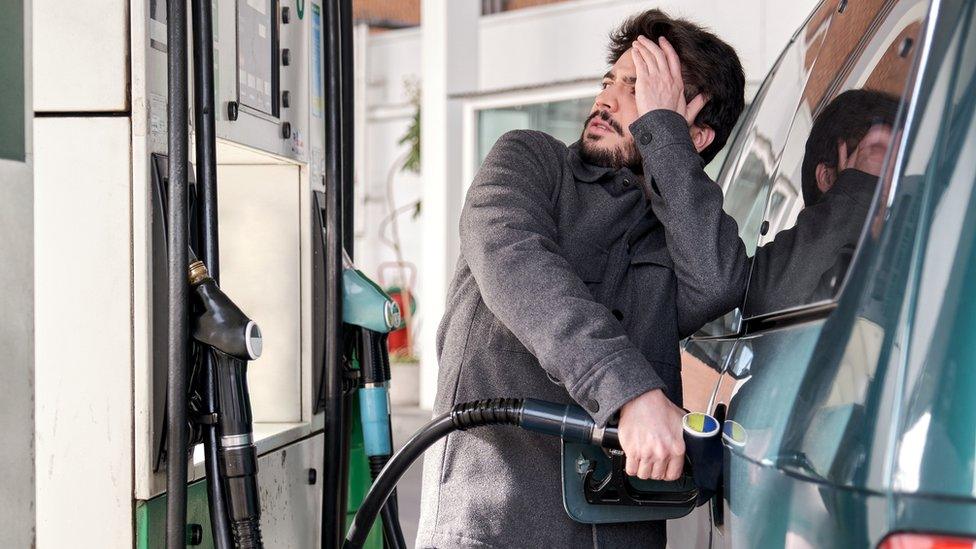Fuel prices: Denbigh care workers turn to electric scooters
- Published
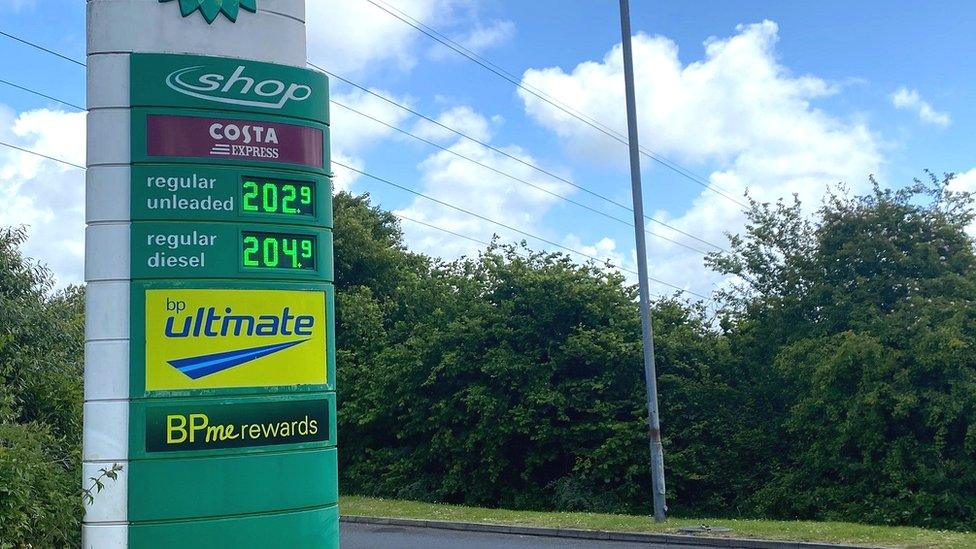
Fuel prices have already climbed above £2 per litre at Swansea West services
"I've had staff come in crying, saying they can't afford the fuel in the car."
Care sector boss Emma Murray has got an electric scooter to help staff who can't afford to drive their own cars to clients' homes.
The RAC said it costs £98 to fill the average car with petrol and £101 with diesel, and warned of further rises.
One Welsh haulage firm said costs have risen by £75,000 this year while a coach company has had to reject school contracts because of fuel prices.
"I've had a couple (of staff) come in crying saying they can't afford the fuel in the car," Ms Murray told Claire Summers on BBC Radio Wales Breakfast.
"I can imagine a couple will think 'I can't work in the domiciliary sector anymore'. Even though I pay the maximum in fuel, it's just not going to work.
"Because we work in a rural area, I've been paying bonuses in order to retain staff."

Care manager Emma Murray says the sector is desperate for staff
Ms Murray runs Vale Senior Care. Most of their clients live in rural Denbighshire and her 10 staff use their own cars to get to their homes.
She was able to get a local authority grant to get a road-legal electric scooter and electric bike to help cut costs, but she does not see it as a long-term solution.
"It could work in seaside towns and small areas, but in Denbigh the roads are narrow," she said.
"It could work in Llandudno on the flat, Rhyl Colwyn Bay, but in Denbigh it's limited.
"You need to be quite fit and not everyone is confident."
Rising fuel costs have made it even harder to recruit in this sector. Last October, Ms Murray described it being at a "critical point" even before fuel increases.
She said staff are "all burnt out" after Covid, adding: "Nothing's going to change, no-one's listening.
"The local authorities have no money, private clients have no money. The funding isn't there."
Expect to pay £2 per litre of fuel
Latest figures from the RAC show the average cost of a litre of petrol rose from 177.88p on Sunday to 178.50p on Monday - a rise of 0.6p in 24 hours.
Over the same period, the average diesel price rose from 185.01p to 185.20p.
RAC fuel spokesman Simon Williams said: "Drivers need to brace themselves for average fuel prices rocketing to £2 a litre which would mean a fill-up would rise to an unbelievable £110.
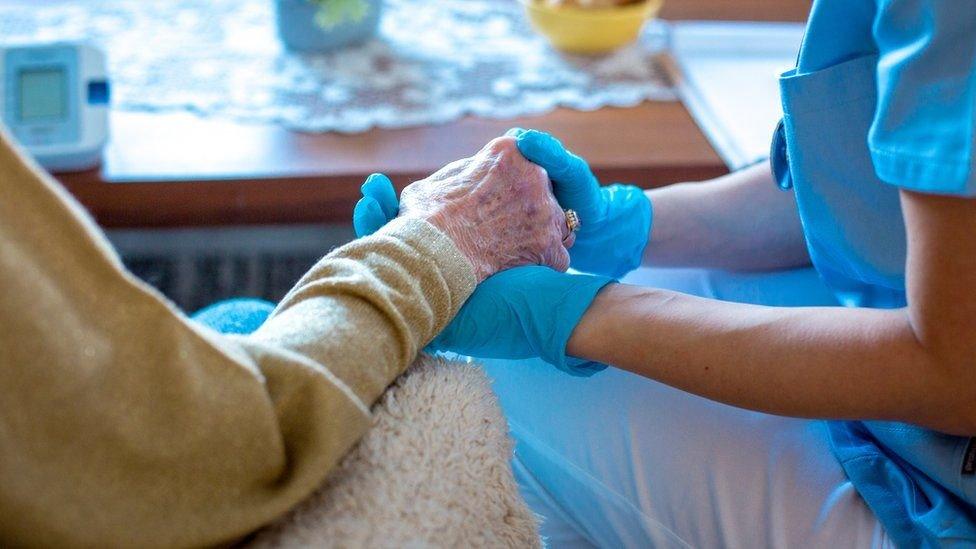
Home care workers are struggling to pay for the fuel needed to visit clients
"We strongly urge the government to take drastic action to help soften the impact for drivers from these never-before-seen pump prices."
Fuel prices at Swansea West services had climbed above £2 per litre on Wednesday.
Unleaded petrol was selling at £2.029 per litre, with diesel on sale for £2.049 per litre.
A spokesperson on behalf of Moto Hospitality, which owns the service station, said current prices "reflect a number of factors".
They added: "In the past week, wholesale oil prices have risen by around 6%.
"As a business we had held off passing this price rise onto customers in recent days in the hope that prices would dip, however no such price drop has occurred, and we have now had to start reflecting some, but not all of the increased wholesale costs in our forecourt prices."
Moto Hospitality also said it was hoping to "find a way of lowering motorway fuel prices sustainably" and bring their prices "in line with the high street".
'Every other cost we have is increasing'
Manager of Crymych haulage firm Frenni Transport, Matthew Francis said his fuel bill increased by £75,000 this year.
"We've had no choice, we've had to pass the fuel increase onto our customers through a fuel surcharge, which at the end of the day gets passed on to the consumers when they buy the product in the stores," he said.
"But it comes to a point where we're going to have to look at a rate increase as well because every other cost we have is increasing."
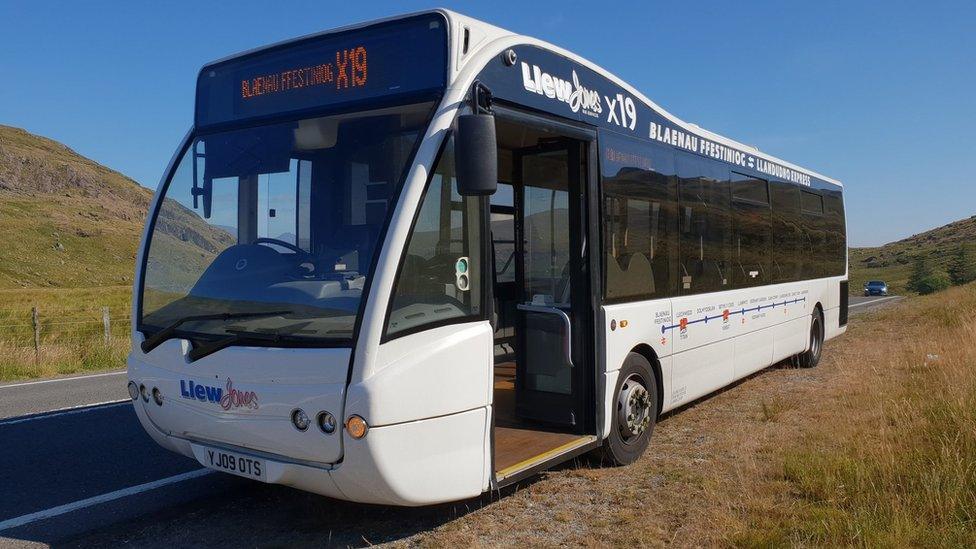
The rises have had a big impact on one coach operator in north Wales
A 40% rise in the fuel costs this year has had a "huge impact" on Llew Jones Coaches, based in Llanrwst, Conwy, according to its managing director.
Steve Jones said: "We have to pass those costs over to the customers and some have been very understanding.
"It's more difficult with contracts for local buses and school buses with the local councils. We've had to surrender some of those.
"We've spent years building the business up and its tragic to have to surrender some of that work."
A plan to name and shame petrol stations that fail to pass on a cut in fuel duty is "still in the works", a UK government source has said.
A formal announcement had been expected last week, but it is understood officials at the Department for Transport are yet to finalise the policy.
- Published7 June 2022
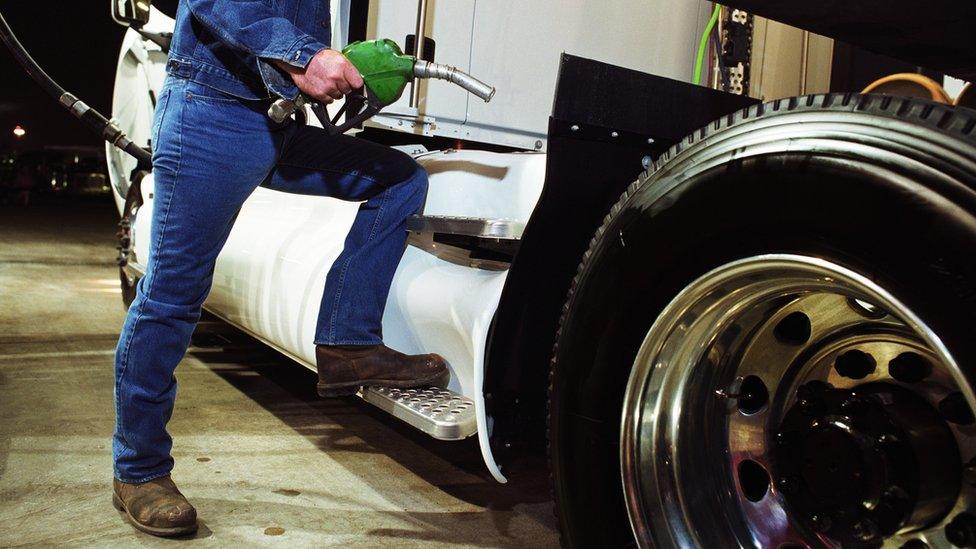
- Published6 June 2022
